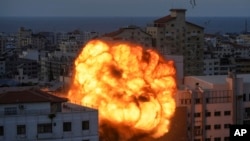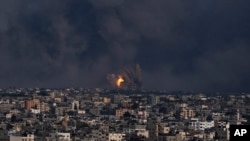The Israeli government formally declared war Sunday on Hamas militants in Gaza, setting the stage for a massive Israeli military response to the Islamist militant group’s surprise attack on the Jewish state.
Israeli Prime Minister Benjamin Netanyahu had already said Saturday his country was at war with Hamas as the militants’ attack raged, but his assessment was rhetorical. The Cabinet decision was an official declaration of war.
Ahead of the Cabinet vote, Netanyahu declared that Israel would “take mighty vengeance” against Hamas, even as Israeli soldiers battled Hamas fighters Sunday in the streets of southern Israel and launched retaliatory airstrikes that leveled buildings in Gaza.
But it was not clear what form a new Israeli response would entail. Some Middle East analysts have suggested that Israel could mount a ground attack into Gaza, which would be a significant escalation of the conflict.
Whatever the response, Netanyahu warned, “This war will take time. It will be difficult.”
Maj. Gen. Ghassan Alian, a key Israel Defense Forces official, said that Hamas had “opened the gates of hell” with its surprise attack and “will bear the responsibility and pay for its deeds."
Israel said that at least 600 people have been killed in Israel, including 44 soldiers, and more than 1,500 injured, while officials in Gaza said 313 people had died in the territory, and nearly 2,000 others were wounded. An Israeli official said the military had killed 400 militants and captured dozens more.
Watch related video by Linda Gradstein:
But Hamas has also seized an untold number of Israelis — women, children and the elderly — and is holding them for a possible exchange for Hamas prisoners.
U.S. Secretary of State Antony Blinken told CNN’s “State of the Union” show that the United States is investigating reports that Americans are among those killed in the fighting. It erupted early Saturday with a barrage of hundreds of missiles launched by Hamas at Israeli targets and a significant Hamas breach of security barriers at the Israel-Gaza border.
Blinken called it “the worst attack on Israel since the Yom Kippur War in 1973.”
The top American diplomat said the U.S. stands firmly behind Israel and the “first concern” of the U.S. is “to make sure Israel has what it needs” to combat the Hamas fighters. Blinken said the U.S. would announce further military assistance to Israel later Sunday.
The White House said President Joe Biden ordered unspecified additional support for Israel after he and Vice President Kamala Harris heard a report on the attack from national security officials.
Watch related video by Veronica Balderas Iglesias:
One U.S. official, New Jersey Democratic Senator Cory Booker, was in Israel at the time of the Hamas attack but sheltered safely before leaving the country on Sunday.
“I emphatically condemn Hamas' horrific acts of violence, kidnapping and terror targeting Israeli families, children and other civilians in towns and cities across the nation of Israel,” Booker said in a statement. “I stand with the people of Israel and the families of those who have lost loved ones.”
The shock attack signaled a significant Israeli intelligence failure, but Blinken declined to assess blame for the moment. “There will be plenty of time to see what anyone missed,” once the military conflict is resolved, he said.
Efraim Halevy, the former chief of Mossad, Israel’s intelligence service, told CNN on Saturday that Israel “didn’t have an inkling of what was going on.”
“We had no warning of any kind, and it was a total surprise that the war broke out this morning,” he said, adding that it was the first time the Palestinians had been able to “penetrate” so deeply into Israel.
The militants launched more than 3,000 missiles in less than 24 hours, according to Halevy. “This is beyond imagination from our point of view,” Halvey said. “We didn’t know they had this quantity of missiles, and we certainly didn’t expect that they would be as effective as they were today. ... As an operation, it was highly successful, unfortunately.”
Hamas and Israel have fought four wars since Hamas took control of Gaza in 2007.
The U.N. Security Council called an emergency meeting for Sunday to discuss the latest violence.
Israeli TV news aired a stream of interviews with relatives of captive or missing Israelis. Those relatives wailed and begged for assistance amid a fog of uncertainty surrounding the fate of their loved ones. In Gaza, residents fled homes near the border to escape Israeli strikes, fleeing deeper inside the territory after warnings in Arabic from the Israeli military.
Many Israelis lined up at health centers to donate blood for their injured compatriots.
The Israeli army said it was working Sunday to clear out Hamas fighters who remained in the country a day after the militant group’s surprise attack on Israel.
“Hundreds of terrorists” have been killed and captured, an Israeli military official said.
The Israel Defense Forces reported fighting at several locations in the south near the Gaza Strip from where Hamas launched its attack Saturday. The locations included the city of Sderot.
Lt. Col. Jonathan Conricus, an IDF spokesperson, told CNN there may have been as many as 1,000 Hamas fighters who entered Israel Saturday.
Israel said Sunday it had launched retaliatory airstrikes, in the Gaza Strip, that hit the Hamas intelligence headquarters, a weapons production plant and two banks.
Much of Gaza has been plunged into darkness since the attacks. Israel maintains a blockade around the territory and Netanyahu announced that Israel will cut the electricity, fuel and other goods it supplies to Gaza.
Hamas kept up its strikes overnight too, firing rockets at several cities, including Tel Aviv.
Meanwhile, the Israeli army exchanged fire Sunday with Hezbollah militants on the Lebanese border, opening up the possibility of a broader conflict, although Blinken said fighting there had quieted.
Lebanon and Israel are considered enemy states, but a 2006 truce between them has held, for the most part with occasional small rocket attacks from Lebanon which Israel has addressed with retaliatory attacks.
Linda Gradstein in Jerusalem contributed to this report; some material for this article came from The Associated Press and Agence France-Presse.












